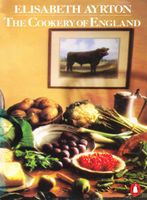Fish
Published 1975

Certain fish such as plaice and mussels and frozen prepared fish dishes such as fish fingers, fish cakes and fillets of cod or plaice for frying, bridge the gap, but many middle-class households serve fish rarely and some never, and many households would never propose it for a dinner-party menu. This is not altogether strange when one considers that the Catholic church throughout Europe forbade meat to be eaten on fast days but allowed fish (as it still does, though with lesser penalties), so that meat became, ipso facto, the food of feasts and all celebrations, fish, since there was clearly no sin of indulgence or gluttony in eating it, naturally being regarded as inferior. Certainly during the long fast of Lent, there was time to become heartily tired of it. In the sixteenth century in England the state joined the church by directing that only fish be eaten on Saturdays, in order to encourage the fishing industry and because of scarcity of cattle and the high price of meat. Fridays and Saturdays both became fish days and in 1563 an attempt was made to make Wednesdays fish days as well. The household books of Ingatestone Hall in Essex show that when the Bishop of Norwich came to stay on a Friday and Saturday with Sir
Become a Premium Member to access this page
Unlimited, ad-free access to hundreds of the world’s best cookbooks
Over 160,000 recipes with thousands more added every month
Recommended by leading chefs and food writers
Powerful search filters to match your tastes
Create collections and add reviews or private notes to any recipe
Swipe to browse each cookbook from cover-to-cover
Manage your subscription via the My Membership page
In this section
Advertisement
Advertisement


